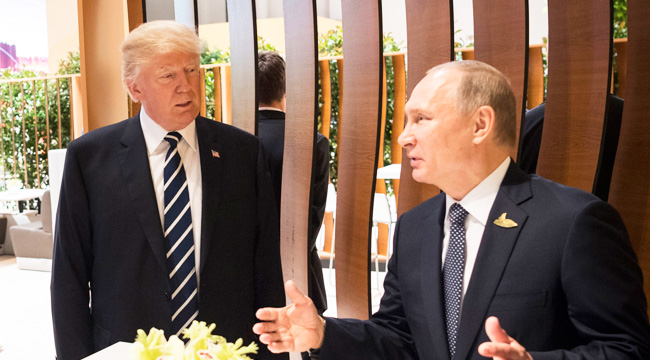
In August, President Trump signed into law a bill passed by the U.S. Congress that effectively increased particular sanctions against Russia for meddling in the 2016 election. Vladimir Putin was unsurprisingly unhappy about the matter, but as American politicians’ and voters’ attentions became enraptured by the expanding Russia probe, the sanctions were largely forgotten. Or at least that was the case until Monday night when, along with House Republicans’ decision to release the so-called “secret memo” alleging FBI corruption, the White House announced it would not impose the Russia sanctions approved by Congress.
According to the Washington Post, the Trump administration said it had determined that the threat implied by the sanctions was “deterrent” enough. As a result, they argued, imposing the congressionally approved sanctions (or adding more) was wholly unnecessary:
The decision was less concrete than some lawmakers envisioned when the Countering America’s Adversaries Through Sanctions Act passed last summer. Though also mentioning Iran and North Korea, the law was billed as a U.S. response to Moscow’s interference in the 2016 presidential election.
A list of potential targets was drawn up last month in anticipation of Monday’s deadline for implementing secondary sanctions. Instead, a State Department official said there is no need for them to be put into place now “because the legislation is, in fact, serving as a deterrent.”
Many Democratic lawmakers, like House Foreign Affairs Committee ranking member Rep. Eliot Engel (D-New York), were displeased. “The Trump administration had a decision to make whether they would follow the law and crack down on those responsible for attacking American democracy in 2016,” he said in a statement. “They chose instead to let Russia off the hook yet again.”
Politics notwithstanding, the White House’s announcement came just as the Treasury Department was on the cusp of “[releasing] a blacklist of Russia’s richest tycoons” with links to Putin. The list itself came with no penalties, but its publication nonetheless irritated the Russian president. According to the Associated Press, Putin called the move a “hostile step” on Tuesday.
(Via Washington Post and Associated Press)
